Simple Home Remedies for Prolonged Periods
By Dr. Charmi Shah +2 more

Get,

to manage your symptom
Get your,


4 Cr+ families
benefitted

OTP sent to 9988776655



You’ve successfully subscribed to receive
doctor-approved tips on
Whatsapp

Get ready to feel your best.

Hi There,
Download the PharmEasy App now!!


Register to Avail the Offer
Send OTPBy continuing, you agree with our Privacy Policy and Terms and Conditions

Hi There,
Sign up on PharmEasy now!!
Trusted by 4 crore+ families

OTP sent to 9988776655



You have unlocked 25% off on medicines




Code: NU25
By Dr. Charmi Shah +2 more
Table of Contents
Prolonged bleeding during periods is a very common symptom that affects one in four women who menstruate1. Generally, a healthy woman experiences 30- 40 ml of blood loss during her menstrual cycle, which ranges from four to seven days. Prolonged menstrual bleeding refers to bleeding that lasts more than seven days and causes around 80 ml of blood loss. Prolonged menstrual bleeding (menorrhagia) is a common symptom of various underlying gynaecological or systemic conditions. Women with prolonged periods may have to change pads or tampons every hour in a day. Prolonged periods may cause disruption in day-to-day activities and is characterised by chronic (heavy or prolonged) bleeding that lasts for more than six months or acute (sudden and severe) bleeding1, 2.

The following can be the reasons for prolonged periods1, 2:
Prolonged periods are accompanied by the following signs and symptoms1, 3:
Diet may play an important role as a supportive measure to manage prolonged periods. The following herbs may be used for prolonged periods:
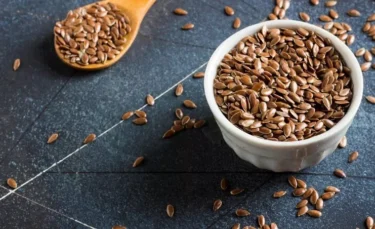
Research6 suggests that flaxseeds may have the ability to regulate periods. Grounded flaxseeds can be added to porridge, oats, muesli, cooked vegetables, or curd and consume them. Always take the advice of a doctor before making any changes to a diet.
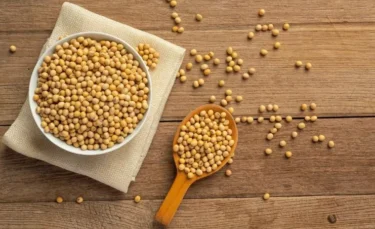
Studies6 suggest that soya protein help regulate the menstrual cycle. Sources of soya protein include, tofu, soya milk, soy nuts, tempeh, and sprouts. Soy proteins may cause allergic reactions, ensure to consult with a doctor before adding soy or soy products to the diet.
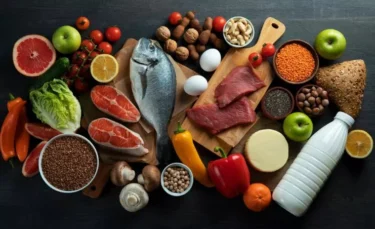
Chronic iron deficiency may result from prolonged periods. Including foods rich in iron in the diet may regulate menstrual flow, especially in cases where there is heavy blood loss on a monthly basis. Consult with a Nutritionist or doctor to see if adding iron to your diet can be beneficial to your situation.
Apricots, raisins, eggs, beans, cooked spinach, ground beef, and chicken are rich sources of iron. Brewer’s yeast and wheat germ are also considered excellent sources of iron6.
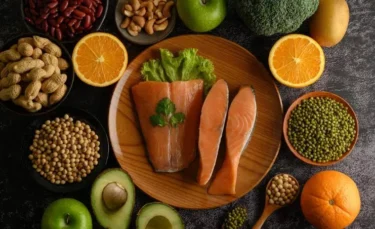
Vitamin A levels in the blood may be low in women having prolonged periods as compared to healthy women. Rich sources of vitamin A include cheese, eggs, oily fish, milk, yogurt, fortified low-fat spreads, liver, and liver products. Seek the recommendation of a healthcare professional before making any changes to the diet6, 7.
Omega-6 fatty acids are abundant in evening primrose oil. Omega-6 fatty acids may enhance fertility by enhancing the structure of reproductive cells, lowering the risk of inflammation, reducing heavy bleeding and enhancing the health of the body’s organs.
Dr. Rajeev Singh, BAMS
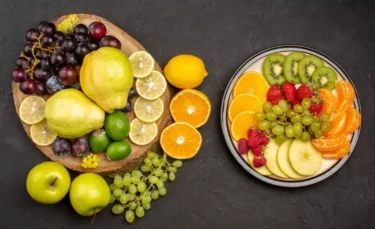
High levels of oestrogen causing the excessive thickening of the endometrium (lining of the uterus) may be seen in some cases of prolonged periods. Studies6 show that vitamin B-rich foods may help in oestrogen metabolism but always ask your doctor to guide you to find the appropriate treatment for your situation.
Dietary sources of vitamin B include eggs, liver, kidney, meat (such as chicken and red meat), fish (such as tuna, mackerel, and salmon), shellfish (such as oysters and clams), vegetables (such as beets, avocados and potatoes), whole grains and cereals, dark green vegetables (such as spinach and kale), beans (such as kidney beans, black beans and chickpeas), nuts and seeds, fruits (such as citrus, banana, and watermelon)7.
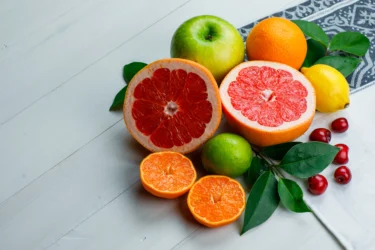
Vitamin C and bioflavonoids may help in making the blood capillaries strong and prevent them from becoming fragile. They also help in the absorption of iron in the body, thereby managing anaemia caused by prolonged periods. Citrus fruits (such as oranges), peppers, strawberries, blackcurrants, broccoli, brussels sprouts, and potatoes are rich sources of vitamin C. Ensure that changes to a diet is only made after consulting with a qualified healthcare professional6, 7.
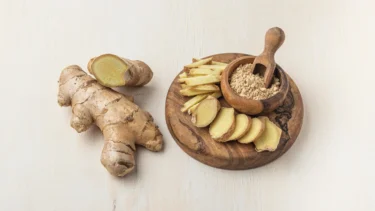
Ginger may act like an anti-inflammatory agent by inhibiting substances like prostaglandin and leukotriene, which cause inflammation. Research3 suggests that eating ginger may be beneficial in reducing pain during prolonged menstrual flow.
To prepare ginger tea, boil grated ginger in water for 10 minutes. Then using a mesh strainer, strain the contents into a glass and drink the tea. Seek a doctor’s recommendation to find out if this is appropriate for your situation.

The bark of Asoka is an astringent, which may help in excessive uterine bleeding during prolonged periods. Boil Asoka bark in water till it is reduced to one-fourth. Then filter the contents and add a little bit of honey to this brew.
Research8 suggests that consuming Asoka before meals may help manage prolonged periods but ensure this is done with the guidance of a healthcare professional.
The touch-me-not (Mimosa pudica) leaves are thought to have properties that are beneficial in menstrual bleeding. Although it has been traditionally used as a home remedy in cases of severe menstrual bleeding, these leaves should only be tried under supervision of a medical professional such as an ayurvedic doctor4.
Dr. Siddharth Gupta, B.A.M.S, M.D (Ayu)
Also Read: Breast Cancer: Foods to Have and Avoid During and After Treatment
Consult a doctor immediately if you notice the following1:
Also Read: What Is PCOD? Know It’s Symptoms, Causes & Treatment
Prolonged periods are a common symptom affecting many women who menstruate. The period may last for more than seven days and is accompanied by heavy blood flow, which may affect the normal day-to-day activities of an individual. Women may experience pain in the abdomen, feelings of exhaustion, tiredness, shortness of breath, etc. The blood flow is so heavy that it might require a change of pad or tampon every hour. There may also be discharge of blood clots.
There are various causes of prolonged periods, which include hormonal imbalance, cancer, non-cancerous growth, infection, and pregnancy-related conditions such as C-sections. Certain dietary changes and herbs may support symptom relief but are not substitutes for medical evaluation, especially when underlying conditions need treatment. Dietary additions that may be helpful include various vitamins (such as vitamin A, vitamin B complex, and vitamin C), iron, soya protein, and flaxseeds in the management of prolonged periods. Herbs like Asoka bark and ginger may also have beneficial properties but should be taken with caution.
Always consult a doctor to understand the benefits of including these herbs and herbal products before making any changes to your diet, to ensure that they are relevant to your condition1,6.
Also Read: 5 Early Signs Of Labour Every Expecting Mother Should Know
Including vitamins, iron, soya protein, flaxseeds, and herbs like Asoka bark and ginger which may help in the management of prolonged periods. Consult a doctor before making any changes to your diet.
Prolonged periods are very common, affecting nearly 27% – 54% of women who menstruate.
A prolonged period becomes a serious condition if one starts showing anaemia-like symptoms such as tiredness, shortness of breath, exhaustion, etc. Anaemia, if untreated, can be life-threatening.
A prolonged period is bleeding that lasts for more than seven days. The duration of bleeding depends upon the cause behind the prolonged period.
Prolonged periods may be caused by pregnancy complications such as ectopic pregnancy, when the fertilised egg implants and grows outside the uterus, miscarriage, and C-section deliveries.
Yes, iron deficiency can cause prolonged periods. Foods rich in iron such as apricots, raisins, eggs, beans, cooked spinach, ground beef, and chicken should be included in the daily diet, especially when blood loss is heavy and persists on a monthly basis.
Anti-inflammatory agents are found to be effective in reducing prolonged menstrual flow. Ginger inhibits prostaglandin and leukotriene synthesis, thereby acting as an anti-inflammatory agent. Therefore, it is used traditionally for the management of prolonged periods.
Disclaimer: The information provided here is for educational/awareness purposes only and is not intended to be a substitute for medical treatment by a healthcare professional and should not be relied upon to diagnose or treat any medical condition. The reader should consult a registered medical practitioner to determine the appropriateness of the information and before consuming any medication. PharmEasy does not provide any guarantee or warranty (express or implied) regarding the accuracy, adequacy, completeness, legality, reliability or usefulness of the information; and disclaims any liability arising thereof
Comments

Leave your comment...
You may also like
Comments